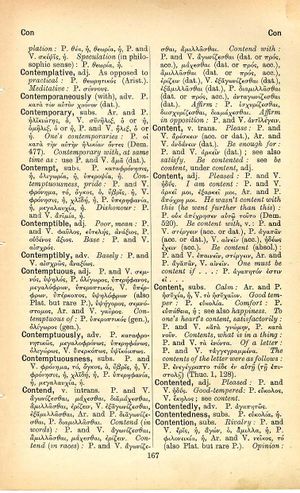content: Difference between revisions
(CSV3) |
m (Text replacement - " . . ." to "…") |
||
| Line 20: | Line 20: | ||
<b class="b2">Be content</b> (absol.): P. and V. [[ἐπαινέω|ἐπαινεῖν]], στέργειν, Ar. and P. ἀγαπᾶν, V. αἰνεῖν. | <b class="b2">Be content</b> (absol.): P. and V. [[ἐπαινέω|ἐπαινεῖν]], στέργειν, Ar. and P. ἀγαπᾶν, V. αἰνεῖν. | ||
<b class="b2">One must be content if</b> | <b class="b2">One must be content if</b>…: P. ἀγαπητόν ἐστιν εἰ… | ||
'''subs.''' | '''subs.''' | ||
Revision as of 10:45, 25 February 2019
English > Greek (Woodhouse)
v. trans.
Please: P. and V. ἀρέσκειν (acc. or dat.), Ar. and V. ἁνδάνειν (dat.).
Be enough for: P. and V. ἀρκεῖν (dat.); see also satisfy.
Be contented: see be content, under content, adj.
adj.
Pleased: P. and V. ἡδύς.
I am content: P. and V. ἀρκεῖ μοι, ἐξαρκεῖ μοι, Ar. and P. ἀπόχρη μοι.
He wasn't content with this (he went further than this): P. οὐκ ἀπέχρησεν αὐτῷ τοῦτο (Dem. 520).
Be content with, v.: P. and V. στέργειν (acc. or dat.), P. ἀγαπᾶν (acc. or dat.), V. αἰνεῖν (acc.), ἡδέως ἔχειν (acc.).
Be content (absol.): P. and V. ἐπαινεῖν, στέργειν, Ar. and P. ἀγαπᾶν, V. αἰνεῖν.
One must be content if…: P. ἀγαπητόν ἐστιν εἰ…
subs.
Calm: Ar. and P. ἡσυχία, ἡ, V. τὸ ἡσυχαῖον.
Goad temper: P. εὐκολία.
Comfort: P. εὐπάθεια, ἡ; see also happiness.
To one's heart's content, satisfactorily: P. and V. κατὰ γνώμην, P. κατὰ νοῦν.
Contents, what is in a thing: P. and V. τὰ ἐνόντα.
Of a letter: P. and V. τἀγγεγραμμένα.
The contents of the letter were as follows: P. ἐνεγέγραπτο τάδε ἐν αὐτῇ (τῇ ἐπιστολῇ) (Thuc. 1, 128).

